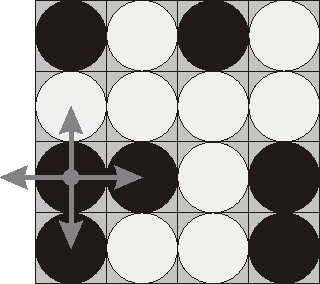POJ1753 搜索
Flip Game
Description
Flip game is played on a rectangular 4x4 field with two-sided pieces placed on each of its 16 squares. One side of each piece is white and the other one is black and each piece is lying either it's black or white side up. Each round you flip 3 to 5 pieces, thus changing the color of their upper side from black to white and vice versa. The pieces to be flipped are chosen every round according to the following rules:
 Consider the following position as an example:
Consider the following position as an example:
bwbw
wwww
bbwb
bwwb
Here "b" denotes pieces lying their black side up and "w" denotes pieces lying their white side up. If we choose to flip the 1st piece from the 3rd row (this choice is shown at the picture), then the field will become:
bwbw
bwww
wwwb
wwwb
The goal of the game is to flip either all pieces white side up or all pieces black side up. You are to write a program that will search for the minimum number of rounds needed to achieve this goal.
- Choose any one of the 16 pieces.
- Flip the chosen piece and also all adjacent pieces to the left, to the right, to the top, and to the bottom of the chosen piece (if there are any).
 Consider the following position as an example:
Consider the following position as an example: bwbw
wwww
bbwb
bwwb
Here "b" denotes pieces lying their black side up and "w" denotes pieces lying their white side up. If we choose to flip the 1st piece from the 3rd row (this choice is shown at the picture), then the field will become:
bwbw
bwww
wwwb
wwwb
The goal of the game is to flip either all pieces white side up or all pieces black side up. You are to write a program that will search for the minimum number of rounds needed to achieve this goal.
Input
The input consists of 4 lines with 4 characters "w" or "b" each that denote game field position.
Output
Write to the output file a single integer number - the minimum number of rounds needed to achieve the goal of the game from the given position. If the goal is initially achieved, then write 0. If it's impossible to achieve the goal, then write the word "Impossible" (without quotes).
Sample Input
bwwb bbwb bwwb bwww
Sample Output
4
思路:用数字来记录棋盘的状态,1代表黑子,0代表白子,可用16位的二进制数表示棋盘状态。则对每个位置的翻子操作结果可以用翻子周围数字之和去异或原数字来表示。
eg:原数字为32如下: 翻子(3,1)即32^(2^3+2^6+2^7+2^11) 结果:
wwww wwww
wwww bwww wwbw bbbw wwww bwww
目标数字为0或65535.
#include "cstdio" #include "algorithm" #include "queue" #include "cmath" #include "cstring" #define inf 0x3f3f3f using namespace std; int g[16]; char s[4][4]; bool use[65536]; typedef struct { int st,s; }N; int bfs(int s){ queue<N>q; N no,ne; memset(use, false, sizeof(use)); no.st=s,no.s=0; q.push(no); use[s]=true; while (q.size()){ no=q.front(); q.pop(); if(no.st==0||no.st==65535){ return no.s; } for(int i=0;i<16;i++){ ne.st=no.st^g[i]; ne.s=no.s+1; if(use[ne.st]){ continue; } if(ne.st==0||ne.st==65535){ return ne.s; } use[ne.st]= true; q.push(ne); } } return -1; } int main() { memset(g,0, sizeof(g)); for(int i=0;i<16;i++){//存储16个翻子操作 int n=15-i; g[i]=pow(2,n); if(n+1<=n/4*4+3){ g[i]+=pow(2,n+1); } if(n-1>=n/4*4){ g[i]+=pow(2,n-1); } if(n+4<=15){ g[i]+=pow(2,n+4); } if(n-4>=0){ g[i]+=pow(2,n-4); } } while (scanf("%s",s[0])!=EOF){ for(int i=1;i<4;i++){ scanf("%s",s[i]); } int st=0; for(int i=0;i<4;i++){//将初始状态转为数字 for(int j=0;j<4;j++){ st<<=1; if(s[i][j]=='b'){ st++; } } } int x=bfs(st); if(x==-1){ printf("Impossible\n"); }else{ printf("%d\n",x); } } return 0; }

